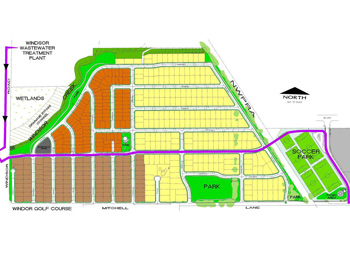Recycled Water and Site Development

Click thumbnail to enlarge
   |
Project:
Vintage Greens Residential Development and Recycled Water
Client:
Condiotti Enterprises
Condiotti Enterprises purchased 108 acres in the Town of
Windsor to build a residential subdivision that would include
475 houses, four parks, a neighborhood center parcel, and a
soccer park facility. What began as a routine development
project ended up being quite unique because of an interest to
add a recycled water component to the new homes for front and
back yard irrigation.
Windsor had long been exploring various options for the use
of recycled water due to their finite right to withdraw water
for potable uses from the Russian River and the limited capacity
to dispose of tertiary treated effluent from their wastewater
treatment plant. One of the most realistic options to overcome
these hurdles was to implement residential recycled water
irrigation.
The Town offered incentives to both the developer and
homeowners to make the plan for recycled water use a reality.
The developer received fee offsets to build the recycled water
infrastructure and homeowners received free backyard irrigation
pipe and sprinklers, as well as free recycled water for ten
years.
Several challenging design aspects were faced, including the
positioning of service laterals to each house and underground
utility main placement. Traditional subdivisions require that
three liquid-conveying utilities (water, sewer, and storm drain)
be contained within the edge to edge limits of city streets,
while maintaining adequate separation from adjacent utilities
and avoiding crossing conflicts. Addition of a fourth utility
(recycled water) to an already crowded layout greatly increased
the potential for utility conflict. Brelje & Race engineers not
only successfully addressed problems presented by this increased
potential but also laid groundwork for new standards governing
the installation of recycled water utilities.
The entire development will use 41 million gallons of
recycled water per year, or approximately 13% of Windsor’s
yearly recycled water irrigation demands.
|







